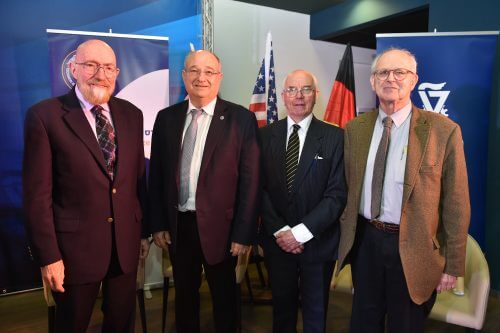Winners of the Nobel Prize in Physics for 2017 - won last June the Harvey Prize in the field of science and technology from the Technion

The winners of the Nobel Prize in Physics in 2017 are Prof. Emeritus Rainer Weiss, Prof. Emeritus Kip Stefan Thorn and Prof. Barry Barish - The researchers who led the discoveries of gravitational waves in 2015 as part of the LIGO experiment. The award will be given to them "for their enormous contribution to the LIGO detector and the first observation of gravitational waves".
four months ago Win a Harvey Award On behalf of the Technion, three LIGO researchers: Prof. Emeritus Rainer Weiss, Prof. Emeritus Kip Stefan Thorne and Prof. Emeritus Ronald Driver, who died shortly before the award ceremony. The Harvey Prize in the field of science and technology was awarded to them "for the first discovery of gravitational waves, verifying a central prediction of Einstein's theory of general relativity and opening a new window into the universe."
"We are awarding you the Harvey Prize for your enormous contribution to the understanding of the universe," Technion President Prof. Peretz Lavi said at the Harvey ceremony to the winners, "You worked on the LIGO experiment for more than three decades and succeeded in achieving the first experimental verification of gravitational waves. You also receive the award for discovering the previous process for merging two black holes and for the enormous technological achievement expressed in the success of the experiment. By absorbing the ripples that come from those black holes, you give us a new tool for studying the universe."
Harvey Award It is the most prestigious scientific award given by the Technion, and it has been given since 1972 in recognition of new and outstanding contributions in science, technology and medicine and an extraordinary contribution to peace in the Middle East. The prize is recognized as a "Nobel predictor", since about 20% of its winners later win the Nobel Prize. The award fund, established by Leo M. Harvey (1887-1973), an industrialist and inventor from Los Angeles, annually awards prestigious awards. Scott Limster, chairman of the Friends of the Technion Association in the USA (ATS), said that over the years the Harvey Prize has become a "Nobel predictor", since about 20% of its winners later win the Nobel Prize. He noted that the legacy of the Harvey family lives on through the award.
The Nobel Prize in Physics will be awarded in December to two of the Harvey Prize winners, Prof. Emeritus Weiss from MIT and Prof. Thorne from the California Institute of Technology, and their colleague Prof. Barry Barish from the California Institute of Technology.
See more on the subject on the science website:
- A collaboration between three observatories resulted in another discovery of gravitational waves (September 2017)
- A new detector will determine the origin of gravitational waves
- Proof of Einstein's theory of general relativity: "The discovery of gravitational waves opens a new window to the universe"
- First evidence for the discovery of gravitational waves
- Einstein's mistakes
- Gravitational waves: the most important discovery of 2016 according to the editors of Science magazine
- A third gravitational wave event has been discovered; Confirms the existence of a new type of black holes
